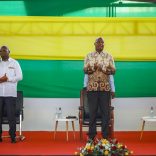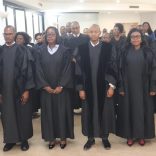Mozambique: Mondlane submits draft law lowering age of majority to 18
Mozambique Elections: New municipal bodies will govern “without legitimacy” and more “clientelism” – analysts

in file CoM
Analysts believe that the new local authorities due to take office in Mozambique on Wednesday will govern “without legitimacy” and in an environment of “political party clientelism”, due to the contestation of electoral results and the reinforcement of the power of Frelimo.
Sixty-five new mayors and new members of the municipal assemblies will take office on Wednesday (07-02), following the local elections of October 11, the results of which have been vehemently rejected by the opposition and some sections of civil society.
“It will be a crisp and tense governance, with a legitimacy deficit caused by the lack of acceptance of the results of the local elections in several municipalities,” says journalist and political analyst Fernando Lima.
Lima maintains that those holding municipal powers will face resistance enlisting the population in their governance programmes, due to unpopularity.
“What political and moral authority will, for example, the mayors of Maputo, the capital, and Matola, the largest municipality in the country, have, when they know that there is strong evidence that they have won in a fraudulent process?” he asks.
Lima also foresees difficulties in securing partnerships with international entities, which are key for local development, due to the lack of credibility of the local election results.
Lázaro Mabunda, university professor and editor of the Electoral Bulletin of the Centre for Public Integrity (CIP), a Mozambican non-governmental organization, argues that the new local governments will be subject to a “risk of illegitimacy”, due to contestation of the election results, and to an increase in “political clientelism” generated by the strengthening of the power of the Front for the Liberation of Mozambique (Frelimo), the party in power, which was declared the winner in 60 out of 65 municipalities.
“By controlling central power and reinforcing control of local power, Frelimo will subject its mayors to political and party clientelism, due to the strong and promiscuous links between party cadres, businesses and the economy,” Mabunda asserts.
Mabunda points out that there is a strong tendency to increase the submission of local bodies to the party apparatus, and Frelimo will be the biggest beneficiary of this, because it controls the main levers of power.
Regarding the lack of legitimacy, he says that mayors in places where the election results were strongly contested will have to quickly produce results that benefit the population, so as to minimise the distance between local governments and citizens.
“If there are changes with a positive impact on people’s lives, the risk of tension in governance will be reduced,” Mabunda says.
This analyst thinks that the deliberate retention by the central government of funds destined for local authorities in municipalities that were governed by the opposition could fall away, given that Frelimo has strengthened its control over these territories.
Mozambique’s sixth municipal elections, in which Frelimo was declared the winner in 60 municipalities out of a total of 65, were strongly contested by the opposition, which did not recognize the official results, and by some sections of civil society.
Since the announcement of the results by the National Elections Commission (CNE), the Mozambican National Resistance (Renamo), the largest opposition party, has led more than 50 protest marches, some of which culminated in skirmishes between party supporters and the police, with some people being arrested and others injured.
Renamo claimed victory in the country’s largest cities, including Maputo, based on parallel counting through the original minutes and notices, but was declared winner in only four municipalities, half of those it had previously held, while the Mozambique Democratic Movement (MDM), the third-largest party in parliament, maintained power in the municipality of Beira.












Leave a Reply
Be the First to Comment!
You must be logged in to post a comment.
You must be logged in to post a comment.